Our next pit stop after an over-night bus journey from hell was Jaisalmer, all the way out in the desert and not far from the Pakistan border. To the un-trained (or over-trained eye) it’s just another Rajasthani city with a different colour scheme – it’s known as the Golden City as literally every single building is made of sandstone. Most magnificent of these sand sculptures is the vast sandstone fort atop a sandy hill; the nucleus of the Jaisalmer action and main attraction for the travelling hordes. Entered through a slowly sloping and spiralling walkway lined with huge sandstone walls; centuries ago you might have had to fear being shot down by an archer from the lofty battlements whilst on this approach. But nowadays all you have to fear is being pulled into one of the alluring textile shops and leaving with your arms full of throws and pockets significantly lighter. It reminded me of a medieval castle made of sand, but filled with eateries, stalls, temples and beautiful (sandstone) havelis.
However, when I think of Jaisalmer what comes to the forefront of my mind are the many people we met in this wonderful city. And for me, Jaisalmer is completely set apart from its stately brothers by the mood of the place.
One of our first acquaintances was a bleary-eyed, tangle-haired young gentleman dressed head to toe in black; Abu. Self-proclaimed Prince of the desert, founder, MC and social secretary of the hotel appropriately named “Abu Safari.” At first he was softly-spoken, shy even, all of his words carefully chosen, but little-by-little it sunk in that he was not the shy and retiring type. Whether it was for linguistic ease or not, but an exuberant “MAMMA MIA” or “CRAZY LIFE” would suffice in nearly every situation. His hostel-world reputation was certainly deserved, as he was one of the most extraordinary characters we met in India. His rags to riches story, tells of how he earned a living as a humble camel guide, after being abandoned by his parents at a young age. He charmed his beloved “tourists” with his crazy sayings, non-sensical songs and refreshing open-mindedness, eventually saving up his tips to buy his first camel. This was the start of his own camel-tour company “Abu Safari” the success of which grew and word of this legendary camel guide spread. Naturally the next stage was to expand from the desert into the hospitality business and he started up the aforementioned hostel, where he today employs his band of merry desert-brothers.
My experience in Jaisalmer is admittedly restricted to the action within the fort and inside the yellow painted walls of Abu Safari, but if I were to draw some universal characteristics of the people of Jaisalmer, I would say they are highly unlike their somewhat austere and tighter lipped Rajasthani brothers. Maybe it’s their proximity to the desert, paradoxically their life source, that has led to their breaking from convention. Growing up amongst the sand dunes, belonging to neither India nor Pakistan, they expressed no care in where these borders were drawn in the sand; freeing them from the pressure to subscribe to a certain way of being, or to care about social and political correctness. There was no use for all of that out here so far away from civilization, and perhaps conventions and traditions never even really made it out here – India’s very own Wild West. Or to take a more cynical approach; if you want to succeed in such a tourist-reliant way of life, the more original you are the better, as nothing draws in the tourists like a crazily charismatic camel-guide. Either way, it seems all the sand and heat has loosened the inhabitants of Jaisalmer up, freeing their unique personalities and fixing their faces with grins breezy enough to penetrate the seemingly inescapable heat.
Each day melted by so quickly it was near impossible to leave. Drawn in by Abu and his mad employees, we spent day after day playing “Karim” (a counter-flicking type game that drew football match like support and cheers) and meeting the constant stream of characters from all over the world that would arrive and depart daily. We trekked into the desert on camels and slept under the stars (we slept under some tarpaulin actually because it conveniently decided to rain in the desert for apparently the first time in 30 years whilst we were there). And so you could look at our time in Jaisalmer and think, what lazy bastards, but I’m more inclined to look back and think how lucky I am to have met such interesting and unusual people.
Perhaps we could credit ourselves with getting past the tourist mask that seasoned hospitality professionals put on. To stop and have a chance to get to know working Indians, rather than have them entertain us in the brief snatches between sight-seeing and then moving on again was a rare treat; for both sides I think. And it’s a sign of the impression that these guys made on us, that I’ve spoken more about them than the absolutely beautiful, sleepily-enchanting city itself. Or, at least I’ll use our Jaisalmer family as an excuse for staying there for nearly two weeks…



















